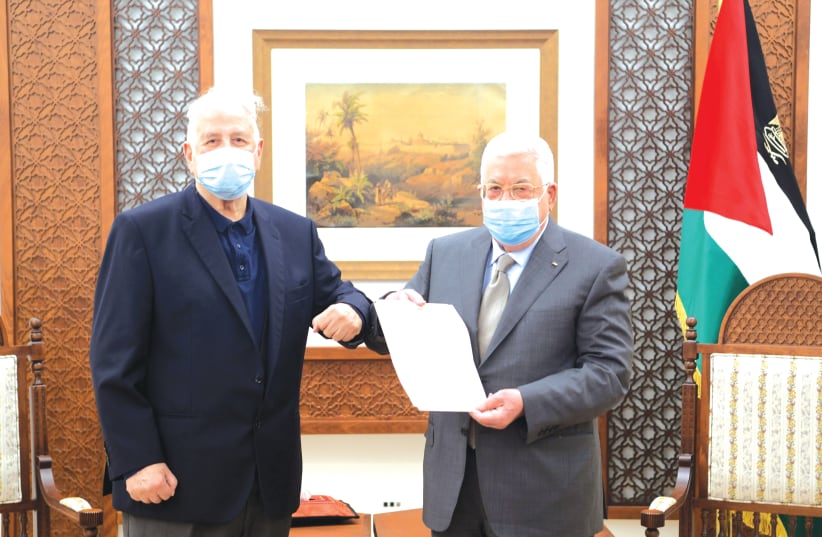That Palestinians may have a chance to vote for the first time since 2006, and that Abbas may allow himself to be judged by the people he has led since he was first elected president in 2005 for a four-year term, is potentially good news. Will the 85-year-old Abbas deliver on the long-promised and repeatedly delayed elections?
For now, voting for the Palestinian Legislative Council (PLC) is slated for May 22, and for president on July 31. Meeting in Cairo on February 9, Hamas and Fatah representatives agreed to terms that will govern the two-step elections process. While holding elections may project a semblance of democratic governance, it does not conceal the reality of an autocratic Abbas based in Ramallah overseeing the West Bank, and a terrorist organization, Hamas, entrenched in Gaza. The two factions have tried multiple times to achieve reconciliation since Hamas violently replaced the Fatah-led Palestinian Authority as ruler of the Gaza Strip in June 2007.
Abbas’s election gambit is risky. Hamas, according to several Palestinian public opinion surveys, could emerge victorious in the PLC elections as it did 15 years ago. No one yet is openly contesting Abbas for the presidency.
Local elections in February 2005 were early indications that Fatah might fail in the January 2006 parliamentary contests. Hamas won many municipal council seats, especially in Gaza. In West Bank cities, Hamas won nearly three-quarters of the vote in Nablus, and about one-third in Ramallah. These elections occurred when the Fatah-led Palestinian Authority, established in 2004 following the Oslo Accords, was governing both pieces of the putative Palestinian state.
Abbas insisted that including Hamas in Palestinian politics would reform the organization. Although the US had designated Hamas a terrorist organization in 1997, the Bush Administration, over the objections of Egypt, Israel, and the PA, encouraged the elections to set an example for democracy in the Arab world. Like Hezbollah in Lebanon, however, it only further legitimized and emboldened Hamas, which calls for Israel’s destruction and views other Arabs, including Abbas, who engage with Israel as enemies.
Some observers have posited that the latest Palestinian elections announcement was aimed at US President Joe Biden. Abbas was one of the first world leaders to congratulate Biden, five days after Election Day.
“I look forward to working with the president-elect and his administration to strengthen the Palestinian-American relations and to achieve freedom, independence, justice and dignity for our people, as well as to work for peace, stability and security for all in our region and the world.”
The Biden administration in its first month has asserted a commitment to a negotiated two-state solution and moved to restore some of the economic and humanitarian aid that former president Donald Trump cut in 2918, after Abbas had decided to boycott the US.
But Biden, as well as Secretary of State Antony Blinken and others, were on hand seven years ago when Abbas summarily ended Secretary of State John Kerry’s vigorous efforts to facilitate a breakthrough in Israeli-Palestinian talks. It was Abbas, however, who walked away from that round of peace negotiations. The last Abbas-Obama meeting at the White House was on March 17, 2014.
It fit Abbas’s established pattern. Whenever he came close to inking a deal with Israel, he balked. Abbas never replied to former prime minister Ehud Olmert’s generous peace proposal in September 2008, repeating Yasser Arafat’s decision to not give a response to prime minister Ehud Barak’s offers at Camp David in 2000 and at Taba in 2001.
Rather than deal with Washington, Abbas in 2011 devised a new strategy to seek recognition of the “State of Palestine” in international bodies. But Abbas misread how Washington would react. The US by law is obligated to cut off funding of any UN body that admits Palestine as a member, and it was enforced soon after UNESCO admitted Palestine in October 2011. The UN Security Council rebuffed attempts by Abbas to gain recognition of the “State of Palestine.”
When Trump recognized Jerusalem as Israel’s capital in December 2017, Abbas immediately declared that he would no longer deal with the United States. It was shortsighted. While he later said he had taken the issue of Jerusalem “off the table,” in fact Trump’s official announcement declared that the decision on Jerusalem would not preclude the outcome of Israeli-Palestinian peace talks.
But Abbas chose to further isolate in Ramallah. He forbade interaction between PA officials and American diplomats after the US Embassy was relocated from Tel Aviv to Jerusalem. Similarly, Abbas’s instant, sharp condemnations of the normalization agreements between Israel and the UAE, Bahrain, Morocco, and Sudan have further sidelined him and the Palestinians.
Direct negotiation between Israel and the PA remains the sound path to a sustainable, comprehensive peace. Whether Palestinian elections can help or hinder the resumption of talks will depend on the outcome – if the voting actually takes place – and ultimately on Abbas’s posture, or that of his successor.
The writer is the American Jewish Committee’s director of media relations.
